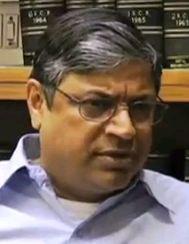Bar Council of India (BCI)
 Intending to increase transparency the Bar Council of India (BCI) has published full minutes to its three last meetings, which primarily deal with the de-recognition of more than 50 law schools but also timetable issues such as whether foreign lawyers should be allowed to practice foreign law in India.
Intending to increase transparency the Bar Council of India (BCI) has published full minutes to its three last meetings, which primarily deal with the de-recognition of more than 50 law schools but also timetable issues such as whether foreign lawyers should be allowed to practice foreign law in India.
Students would get to complete law degrees they enrolled in at derecognised law colleges or transfer to other institutes, promised the Bar Council of India (BCI) chairman Gopal Subramanium.
 Procedural delays were set to derail the discussions on the merits in the All India bar examination court challenges, as the Supreme Court has adjourned the hearing in the transfer petition to 20 October after ordering the issue of fresh notices to the respondents and the shifting of the case to the Delhi High Court was not mentioned.
Procedural delays were set to derail the discussions on the merits in the All India bar examination court challenges, as the Supreme Court has adjourned the hearing in the transfer petition to 20 October after ordering the issue of fresh notices to the respondents and the shifting of the case to the Delhi High Court was not mentioned.
 Indian lawyers planning to qualify as English solicitors were thrown into temporary tizzy this week, as the new Qualified Lawyers Transfer Scheme (QLTS) came into effect. Under the new rules Indian lawyers will not be allowed to apply to practise in the UK, as India is not included in the list of jurisdictions to benefit from the QLTS.
Indian lawyers planning to qualify as English solicitors were thrown into temporary tizzy this week, as the new Qualified Lawyers Transfer Scheme (QLTS) came into effect. Under the new rules Indian lawyers will not be allowed to apply to practise in the UK, as India is not included in the list of jurisdictions to benefit from the QLTS.
The law ministry is considering setting up a law firm regulator with a code of conduct to govern law firms in order to end the “free environment without any regulations”, reported the Hindustan Times.
 he Bar Council of India's (BCI) ambitious weekend meeting decided to introduce draft lawyers' ethics guidelines in two days and how to begin decreasing the number of law colleges in India. But due to time constraints the body had to postpone its decision on the entry of foreign law firms in respect of the Chennai writ petition, as well as Trilegal's queries about converting to a limited liability partnership (LLP).
he Bar Council of India's (BCI) ambitious weekend meeting decided to introduce draft lawyers' ethics guidelines in two days and how to begin decreasing the number of law colleges in India. But due to time constraints the body had to postpone its decision on the entry of foreign law firms in respect of the Chennai writ petition, as well as Trilegal's queries about converting to a limited liability partnership (LLP).
 For once it seems the American law firms rather than the Brits publicly took the lead in India.
For once it seems the American law firms rather than the Brits publicly took the lead in India.
 Bar Council of India (BCI) chairman Gopal Subramanium said that the BCI would crack down on any recently enrolled lawyers who were practising law without having passed the proposed bar exam and that law colleges whose graduating law students did not take the bar exam could be derecognised.
Bar Council of India (BCI) chairman Gopal Subramanium said that the BCI would crack down on any recently enrolled lawyers who were practising law without having passed the proposed bar exam and that law colleges whose graduating law students did not take the bar exam could be derecognised.
 The bar council of Maharashtra and Goa said today that it would oppose the proposed all India bar exam after a decision reached by 11 chairmen of different state bar councils on 31 July, although the body admitted that unless the Bar Council of India (BCI) or a court intervened the exam would go ahead.
The bar council of Maharashtra and Goa said today that it would oppose the proposed all India bar exam after a decision reached by 11 chairmen of different state bar councils on 31 July, although the body admitted that unless the Bar Council of India (BCI) or a court intervened the exam would go ahead.
 After more than two months the Bar Council of Maharashtra & Goa has agreed on its committee make-ups including the positions of chairman and Bar Council of India (BCI) delegate, as youngest member Karan Bhosale is proposing to radically increase computerisation through a new IT committee, roll-out wireless internet to the Bombay High Court and hike the welfare fund pay-outs.
After more than two months the Bar Council of Maharashtra & Goa has agreed on its committee make-ups including the positions of chairman and Bar Council of India (BCI) delegate, as youngest member Karan Bhosale is proposing to radically increase computerisation through a new IT committee, roll-out wireless internet to the Bombay High Court and hike the welfare fund pay-outs.
 The Supreme Court today outright dismissed one public interest litigation (PIL) against the bar exam filed by a Delhi University law graduate and issued directions to combine the pending national high court writ petitions against the bar exam for hearing before the Delhi High Court, as Friday's Bonnie FOI case hearing was adjourned.
The Supreme Court today outright dismissed one public interest litigation (PIL) against the bar exam filed by a Delhi University law graduate and issued directions to combine the pending national high court writ petitions against the bar exam for hearing before the Delhi High Court, as Friday's Bonnie FOI case hearing was adjourned.
"The legal profession in so-called advanced countries is a product of Industrial Revolution whereas in India it is a product of Independence Revolution"
These are the words that made me think. Should foreign law firms be allowed in India? Are they necessary?
Just as I questioned myself, a small part inside me said ‘Yes’ immediately. It was then, that I thought about it properly and tried to research on it.
Past:
In 1994, two New York-based and one London-based law firm had sought permission from the Reserve Bank of India (RBI) to begin liaison office activities in India to advise and assist non-Indian clients in connection with their activities in India and outside India. The three law firms, White & Case (NY), Chadbourne & Parke (NY) and Ashurst Morris Crisp (UK) were granted permission under the Foreign Exchange Regulation Act (FERA) to start liaison activities. However, in 1995, Lawyers’ Collective, a public interest trust set up by lawyers to provide legal aid, moved Bombay HC challenging the right of foreign law firms to “practice law” in India. The High Court had held that the practices engaged by these firms amounted to “practicing the law” and hence were not to be permitted.
Under Section 7(1) of the Advocates Act 1961, foreign law degrees are recognized by the Bar Council of India on a reciprocal basis, and legal academics can teach and engage in legal research without any bar. However, foreign nationals are prohibited from “practicing law” in India as per the same Act.
Countries other than India, usually have two types of lawyers. Barristers and Solicitors. Solicitors can give advice and draft documents but cannot argue in the court. Barristers can do everything that solicitor can and also argue in the court. Indian lawyers can do both, and they usually do it too.
The biggest problem with this debate is that there is a lot of false news going around regarding the it. A lot of people are given only one side of the story and choose sides based on it. We are human beings, we will always oppose change.
Foreign law firms are not here for advocacy work, they are here for transaction work. All the Indian law firm’s majority work is transaction work. Why will they not oppose competition? Who would not want a closed market for such a huge and growing economy? It is simple economics.
The argument in favour of the Indian law firms is that they will bring in professionalism. I am definitely not saying that the current firms are not professional. I mean that global competition will force them to become better than they are right now. Increased competition is always good for the consumer and the economy.
Reciprocity and international law obligations are also very strong arguments. Foreign countries allow Indian lawyers to work there, after certain small requirements are met with, then why should we not reciprocate the favour? India is a founder member of World Trade Organisation’s (WTO), General Agreement on Trade in Services (GATS). The main objective of this agreement is to facilitate free flow of services across the world.
Other countries which allow foreign lawyer and firms have certain restrictions. For example in California the Foreign Law Firms were only permitted to deal in laws not specific to California. In countries like Singapore, Hong-Kong and Japan they are restricted to servicing only foreign firms. The models of all these places, their practices, rules and regulations need to be analysed thoroughly before being incorporated into the Indian system.
There have been news that government is going to allow foreign law firms in a short while. There is immense pressure on the government from both sides. Foreign governments are pressurising it to allow the entry and Indian law firms and the Bar Council of India is asking it to go against it. There have been speculations that foreign law firms may be allowed to enter but in phases. In the first phase, they will be allowed to set up offices here but it has to work solely as if it is outsourcing its work to India. In the second phase they will be allowed to do transaction work in India. It might be restricted to work for foreign companies who are working with Indian companies. In the third and the final phase, they will be given total access. They will be treated like any other lawyer in India. Although they might have to pass some examination. It is still not very clear.
If we look at it in a strict sense then we can see that they are already here. We are all aware of the so called ‘friendship agreements’ between foreign law firms and Indian law firms. They have common training programmes and a lot of other such things. So they are already making a foundation for an entry.
I don’t understand one thing though. It’s a really simple question. If they have allowed us into their markets then why can we not allow them in our? I would like to refer to the book ‘The World Is Flat’ by Thomas Friedman. It advocated the fact that the world is now a common market and all the products and services are launched will have a level playing field. This is not the condition with our legal services. We want other countries to open up their markets. We ask them for more lenient laws for settling there and doing business there. We want all other countries to follow GATS, but what are we doing? How hypocritical are we?
The humorous part is that foreign law firms are not being bogged down. They are pretty smart too. Apart from the ‘friendship agreements’ they have already started hiring fresh law graduates from law colleges in the country. They are giving them monetary benefits which are much more than the average that Indian law firms are providing. They are brain draining us. Their message is clear, if you don’t allow us to work in your country then we will take your brightest law graduates and camp them in our country and charge you in pound sterling or dollars or whatever.
Foreign law firms are more professional. They don’t have the ‘only 20 partners’ restriction. So they have a lot of partners and so employees there have a higher chance of becoming a partner. Indian government is planning on bringing in Limited Liability Partnerships. This way, the situation in India will change. I have heard that Clifford Chance has over 600 partners. I am not sure but if it is then I am surprised.
My suggestion:
Let them enter. They will make the market more client friendly. They will bring more jobs. They will being professionalism. Indian law firms are already facing a lot of competition but are still able to hold on to the top spot. I don’t think they will have a problem with that later on. You cannot avoid competition forever. There should be Special Exams for foreign lawyers so that the quality of lawyers that are allowed to practice can be moderated. Multi National Companies have changed the entire business scene. They have made a MBA degree a special qualification. The students now get a higher salary because they are now wanted by a larger population. Something similar can happen to a law degree. This is very important for people who consider National Law Schools are the IIM’s of law just like people think that IIT’s are the IIM’s of engineering. No one’s vested interest should come in the way of common good. I am not advocating the entry for monetary purposes. I am supporting it so that Indian lawyers become more efficient. They have started slacking in their effort. There is a scarcity of ‘good’ lawyers and law firms in the country. They can be counted on our fingers. I want it to change.
Future:
The decision is still pending. Mr. Law Minister is not ready to take a stance. No organisation/website wants to take sides because they are afraid of backlash if the decision goes against them. A lot of polls have been conducted, all which showed a majority of people who want foreign law firms in India.
Don’t push India back by trapping its economy. Imagine the situation if we had not liberalized the economy in 1991. Let’s not do anything that we might regret in the future.
Disclaimer:
I am not against Indian law firms or the Bar Council of India. I am pro-liberalization. Let the democratic country do its thing. Sorry for the unusually long post. I hope I have made my point.
Constructive suggestions are welcome.
Related read:
On a lighter note: A picture is worth a thousand words. Click here.
 The Bar Council of India (BCI) has responded to common queries and concerns about the bar exam, explaining that the BCI is discussing options to ameliorate lot of 2010 batch graduates, that legal challenges will cause no shift in timetable, and that the Rs 1,300 test fee is reasonable, answering questions relating to Rainmaker's appointment to assist in the exam.
The Bar Council of India (BCI) has responded to common queries and concerns about the bar exam, explaining that the BCI is discussing options to ameliorate lot of 2010 batch graduates, that legal challenges will cause no shift in timetable, and that the Rs 1,300 test fee is reasonable, answering questions relating to Rainmaker's appointment to assist in the exam.
 The Bar Council of India (BCI) has set itself less than five months to kickstart the overhaul of Indian legal education, beginning with a revised accreditation requirements for law schools, phasing out three-year LLBs, introducing benchmarking of colleges, standardising the academic calendar, creating a new national curriculum and improving teaching and continuous education.
The Bar Council of India (BCI) has set itself less than five months to kickstart the overhaul of Indian legal education, beginning with a revised accreditation requirements for law schools, phasing out three-year LLBs, introducing benchmarking of colleges, standardising the academic calendar, creating a new national curriculum and improving teaching and continuous education.





